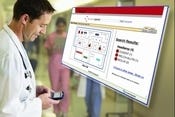Verizon Expands Medical Data ExchangeVerizon Expands Medical Data Exchange
Addition of medical images and lab test results positions the firm to tap into the mushrooming health IT and electronic medical record markets.

Slideshow: Siemens Healthcare Data Center Virtual Tour |
|---|
As Verizon prepares for the shift in healthcare from paper-based systems to electronic medical records (EMRs), the company announced Thursday that its medical data exchange platform will now accommodate the sharing of medical images and lab results between physicians and other clinicians.
Launched in March, the Verizon Medical Data Exchange is transitioning from a service that provided only transcriptionist-to-physician and physician-to-physician sharing of dictated notes to an exchange that now allows healthcare delivery organizations to share a broader range of digital records such as X-rays, blood tests, and other lab results.
One of the original members of the exchange is MD-IT, a Boulder, Colo.- based company that provides medical documentation software and services. By linking its platform to the exchange, MD-IT's 7,000 physicians nationwide can share medical documents, which speeds the diagnosis and treatment of patients while eliminating the financial burden of investing in new technology.
According to Robin Daigh, VP of marketing and business development at MD-IT, the strategy has been to draw in the dictation transcription providers first, because the vast majority of medical notes are created and stored with this group. "The idea was to get those folks first because, for our clients, the greater the different types of notes and the different types of patient information available on the exchange, the more valuable it is," Daigh said.
Currently a PDF, a text, or an image file can be sent securely through the exchange. Verizon hopes medical facilities will see this method of transporting records as a better alternative than sending documents by fax or snail mail.
Further, Verizon wants to tap into a medical records market that is evolving. Currently, medical data transport standards are lacking and EMRs are being built around hospital systems which, in many cases, drive the adoption of one type of EMR technology that forms the nucleus for the practice community.
"What you find is that most hospital systems basically created an EMR environment, and then they try to bring people into that environment by signing them up for that EMR," said Ardi Kazarian, senior product manager of medical data exchange for Verizon Business. "The problem with most of the systems is that to do any kind of communication with anybody else you have to write an interface and so you are talking about potentially writing hundreds of interfaces out into a community to reach all the different systems that are out there."

Slideshow: RFID In Healthcare
Slideshow: RFID In Healthcare (click image for larger view and for full slideshow)
Kazarian said the benefit of the exchange is that it's trying to get away from conducting a point-to-point interface.
"If we can get EMRs to be built onto the exchange, then we simply have to write basically two interfaces -- one for sending and one for receiving information. That's a huge first step in simplifying the process of exchanging medical information," Kazarian said.
Kazarian also said that because the healthcare industry is deliberating over what standards it will select for data transfer, a lot of the ability to exchange medical information has been stalled.
"That has put a screeching halt to things. What the exchange is saying is let's start by getting the information flow going electronically, and then, once we can begin to establish those electronic delivery standards, we can then start to do a better job of standardizing what we are sending," Kazarian said.
Verizon executives also said the exchange is preparing for the day when the industry will have settled on clinical data transport standards, EMRs will be much more pervasive at medical facilities, and health information exchanges will be further along in their development, in anticipation of the more than 30 million individuals that will enroll in health insurance plans over the next five to 10 years.
In the meantime, Verizon said it continues to sign on new members to the expanded exchange. These include Alert Notification, a personalized emergency notification and health records provider; Amaji, a provider of digital clinical documentation services; NLP International, a provider of natural language processing software; Tolven, a provider of open-source health informatics software solutions; and ZyDoc Medical Transcription, a provider of medical knowledge-management solutions.
These members join the founding members of the group, which include Verizon; ICSA Labs, an independent division of Verizon Business; the Medical Transcription Industry Association; and medical transcription companies MD-IT, MedQuist, MxSecure, Sten-Tel, and Webmedx.
In addition, the Medical Transcription Service Consortium, which was created to support the operation of the exchange, has been renamed to reflect the consortium's expanded mission and focus. The new name for the group is the Medical Data Exchange Consortium. ICSA Labs continues to play a key role in managing the consortium and its activities as a neutral third party.
About the Author
You May Also Like






